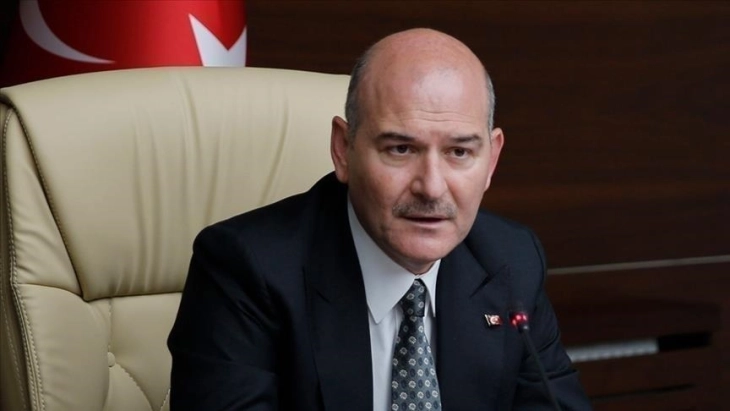More deaths, injuries and chaos as new quakes shake Turkey and Syria
- Several people died and hundreds more injured as new earthquakes shook Turkey and Syria on Monday evening, that come as the region responds to the devastation wrought by quakes two weeks ago that left tens of thousands of people dead.

Istanbul, 20 February 2023 (dpa/MIA) - Several people died and hundreds more injured as new earthquakes shook Turkey and Syria on Monday evening, that come as the region responds to the devastation wrought by quakes two weeks ago that left tens of thousands of people dead.
At least three people died after the latest earthquakes in the Turkish province of Hatay, while 213 people were taken to hospitals, Turkish Interior Minister Süleyman Soylu said.
His comments came after two quakes occurred, three minutes apart, measuring 6.4 and 5.8, according to AFAD, Turkey's disaster management agency.
The epicentre was in the district of Samandag in Turkey according to Turkish monitor Kandilli but it was felt by residents in Syria, Israel, Iraq, Lebanon and Palestine, according to media reports.
Soylu warned people not to enter buildings, saying there had been 26 aftershocks so far.
Rescue workers in the city of Antakya were working to free three people trapped under rubble in the evening, state news agency Anadolu reported.
Across the border in Syria, there were further injuries as people were gripped with fear and damaged buildings toppled.
"Hospitals and medical centres have so far recorded, according to the information I received, more than 125 injuries in north-western Syria after the earthquake that struck the region, most of which are injuries resulting from fear and panic, jumping from buildings, or fainting cases," Head of Syrian rescue group the White Helmets Raed Saleh tweeted.
People jumped off rooftops and balconies of houses as they tried to rush to safety in rebel-held north-west Syria, a monitoring group said.
There were also casualties from falling rubble in Salqin, Harem, Idlib, Khirbet al-Juz and rural areas near Aleppo, the Britain-based Syrian Observatory for Human Rights said.
In government-held areas, damaged buildings fell in Al-Midan and Al-Jamiliya neighbourhoods in Aleppo, the monitor said.
Buildings also collapsed in the small town of Jindiris, already hard hit by the earlier quakes, according to a spokeswoman for the aid organization SAMS.
Some 30 people were treated for injuries in five of the organization's clinics, including a child in cardiac arrest, she said.
People were roaming the streets in many areas, including in Damascus, fearful of further tremors, tweeted UN Refugee Agency (UNHCR) spokeswoman for the region, Rula Amin.
There have been 20 aftershocks so far, Turkish Vice President Fuat Oktay said on Monday evening.
The latest quake comes two weeks after a devastating earthquake in the same area that has killed more than 47,000 people in Turkey and Syria.
Abdel Kafi, a Syrian activist in north-west Syria said, "It was strong like the first one but did not last long... it scared people and people rushed to the streets."
He was referring to the quakes on February 6 that killed 41,156 people in Turkey alone, AFAD said earlier.
The official death toll in Syria stands at 5,900 but it has not been updated in days. Thousands more are feared dead in both countries.
The latest quake came hours after US Secretary of State Antony Blinken met Turkish President Recep Tayyip Erdoğan in Ankara, just before the Turkish leader flew to Hatay.
Blinken had met civilian aid workers from the White Helmets during his visit to the region, who told him about the desperate situation faced by survivors in areas where the decade-long civil war has complicated international efforts to deliver aid and assistance.
White Helmets deputy Farouk Habib described US support as "crucial" during the meeting with Blinken. Habib told dpa afterwards that Blinken reiterated US support for uninhibited humanitarian aid access to the region.
A tour of the earlier destruction in Turkey had left Blinken grasping for words to describe what he saw. He had earlier announced that the US would increase aid for the disaster from $100 million to $185 million.
Blinken praised the work and expertise of the White Helmets and the search and rescue teams, speaking of "heroic efforts" after the disaster, particularly given that aid was slow to arrive in the opposition areas of north-western Syria.
In Syria alone, 8.8 million people have been affected by the earthquakes, the deputy UN representative for Syria, Najat Rochdi, had tweeted on Sunday.
Activist Mustafa Dahnoun, from Idlib, meanwhile told dpa over the phone that "aid is still very slow" and that people in the area "are in great need of everything."
"The world community should work harder and push for more aid to our region," he said.







